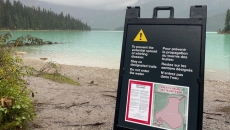The federal transportation minister says national co-operation is needed to close loopholes criminals can use to re-sell stolen cars.
Anita Anand's office has sent letters to her provincial and territorial counterparts calling for meetings to discuss the issue of Vehicle Identification Numbers being changed on stolen cars which are then resold, a process known as "re-vinning" vehicles.
To combat auto theft, all levels of government have a role to play. My message to the provinces and territories is clear: Work together to stop re-vinning and put an end to these loopholes. There is more work to do to bring down auto thefts in Canada. pic.twitter.com/F7U1sFvPDz
— Anita Anand (@AnitaAnandMP) October 27, 2024
The minister's office says in the letters that the long-standing Interprovincial Record Exchange can assist in detecting re-vinning, and that all provinces and territories need to participate fully in the system.
Her office says provinces and territories need to ensure the record exchange technology they are using is up to date in order to communicate with other jurisdictions, otherwise potential thieves could find ways around it.
Back in May, the federal government unveiled a national plan combating auto theft which includes more intelligence sharing among police forces and a working group involving all levels of government.
It also calls for more interventions at ports, with the Canada Border Services Agency tasked with expanding searches of shipping containers in a bid to stop vehicles from being sent overseas.
Anand's office says although there has been a drop in overall thefts, police have reported a rise in VINs being changed on stolen cars.
"Given the importance of addressing the issue of re-vinning, I am asking all provinces and territories to prioritize this issue in order to further deter and prevent auto theft in Canada," Anand writes in her letter.
"While the long-standing Interprovincial Record Exchange can assist in detecting the re-vinning of vehicles, all provinces and territories need to participate fully in this system to close the loophole that is being exploited by criminals to re-sell stolen vehicles within Canada."
More than 1,900 stolen vehicles were intercepted by the Canada Border Services Agency, the majority of which were found in Quebec.
Statistics released earlier this month by the Insurance Bureau of Canada show more than 4,000 fewer vehicles were stolen in the first six months of 2024, compared to the same period a year ago, though the bureau cautioned the numbers are still more than twice what they were 10 years ago.
Much of the auto-theft problem is centred in Ontario and Quebec, with stolen vehicles being routed through the Port of Montreal and then shipped overseas.
According to insurance crime watchdog Équité Association, 28,550 vehicles were stolen in Canada in the first half of 2024. The watchdog's finding pointed to a 17 per cent decrease in thefts from the year prior.
More than 70,000 private vehicles were stolen across Canada last year, with more than 30,000 taken in Ontario, according to the Équité Association, an anti-crime organization funded by insurance companies.
Asked about Anand's letter on Sunday, Ontario Transportation Minister Prabmeet Sarkaria agreed that more has to be done to stop auto theft.
One of the potential solutions is bail reform, he said at an unrelated morning news conference in Toronto.
"Let's fix our justice system so those people that are stealing these vehicles, coming into people's houses at gunpoint, taking cars away from people in parking lots...have stiffer penalties," he said.
Sarkaria added the province has been pushing for the "toughest penalties" on re-vinning and anyone trying to steal vehicles.
"But it's important that the federal government step up, do their part and put these people behind bars."






